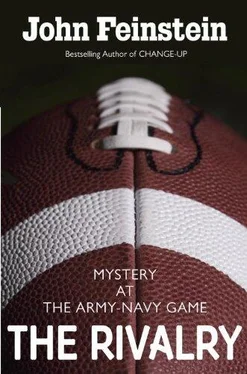“Fine. Daniels will be carrying it. Lucky for you, it only shoots blanks.”
Susan Carol blanched. Stevie could joke about it, but her ongoing conflict with the officials had shaken her up more than she cared to admit. Even with all the scandals she and Stevie had broken, she’d never had a story come back at her the way her story on the officials had. She’d never felt such an outpouring of venom. Worse was that she couldn’t quite shake the feeling that maybe they had a right to be mad at her. That in the heat of writing her story about the Navy-Notre Dame game, she had let her emotions carry her too far.
Susan Carol and Tamara were at dinner in a private dining room with the Navy team on the night before the Notre Dame game. Having been around NFL players in the past, Susan Carol was amazed at the size-or lack of it-of the Navy players.
“Where are all the linemen?” she asked Tamara as they stood in the buffet line.
“I’m a lineman, ma’am,” the player in front of her said.
Every player they had been introduced to so far had called Susan Carol “ma’am.” She knew she looked older than fourteen, but the players had to know she was younger than they were. And yet she kept getting called “ma’am.”
“I’m Susan Carol Anderson,” she said, putting out her hand. “And I’m only fourteen, so you don’t have to call me ‘ma’am.’ Are you really a lineman?”
The player smiled. “Yes, ma’am, I am. I’m Garrett Smith, and I start at offensive tackle. It’s nice to meet you.”
“How much do you weigh, Garrett?” Susan Carol asked. For a normal human being, the player was huge, but for a college football lineman at the highest level, he was tiny-barely taller than she was. She had read the Notre Dame media guide on the way out and had noticed that the smallest starting offensive lineman weighed 305 pounds.
Garrett Smith smiled at the question. “Well, once I’m through eating here, I hope to weigh two sixty-five.”
“So why’d you choose Navy, Garrett?” Susan Carol asked as they picked up plates. “Were you recruited anywhere else?”
“Oh, lots of places,” Smith said. “Dartmouth, Yale, Holy Cross. Williams and Wesleyan really wanted me.”
Those were all great academic schools, but none played powerhouse football.
“Well,” Smith amended, “ I recruited Dartmouth and Yale. They said they’d let me try out if I went there.”
“You must be a good student,” Susan Carol said.
“Pretty good,” Smith answered.
“How good is pretty good?”
Smith was now filling his plate with as much pasta and chicken as could possibly fit on it.
“My GPA is 3.87.”
“Yeah, I’d say that’s pretty good,” Susan Carol said. “What’s your major?”
“Thermonuclear engineering.”
Susan Carol couldn’t help but laugh. She knew she was in a different world than the one that existed at the big-time football schools. She thought back to the Final Four when she and Stevie had rolled their eyes at the press conference moderators who kept referring to all the players as “student-athletes,” even though fewer than forty percent of the starters on teams that made the tournament ever graduated. At Navy-and she was pretty sure at Army too-the players really were “student-athletes.”
After she and Tamara had gotten their food, Susan Carol saw Coach Ken Niumatalolo waving them over to his table.
“Must be getting close to Army-Navy,” he said with a smile, giving Tamara a friendly hug. “Is this the young lady that Kathy and Camille told me about?”
Tamara nodded. “Susan Carol Anderson, this is Ken Niumatalolo, a lovely man with an impossible-to-spell name.”
“Just write ‘Niumat,’ ” Niumatalolo said. “Or, even better, write more about the kids and less about me.”
They sat down and Niumatalolo introduced some of the coaches around the table, including Ivin Jasper, the offensive coordinator, and Buddy Green, who was in charge of the defense.
“Susan Carol just got her first sense of what makes a Navy football player,” Tamara said. “She met Garrett Smith.”
Niumatalolo laughed. “Honestly, when I tell other coaches at the civilian schools about our players, they don’t believe me,” he said. “They can’t believe that kids who work this hard academically-not to mention the military training-can compete the way they do. We’ve got twelve plebes on this trip. They’ve all had watch at some point this week.” Susan Carol looked confused, so he explained, “It means they have to stay up all night and watch some portion of the Yard-which is our campus. With most of our opponents, if a player is up all night, it’s because he’s at a party.”
“Don’t forget six-weekers,” Jasper said.
“Yeah, true,” Niumatalolo said. “On our academic calendar, students take tests every six weeks. The only reason we’ll have a curfew tonight is because we don’t want the guys staying up all night to study.”
The more she heard, the more Susan Carol understood why Tamara and Bobby Kelleher thought this game was so special.
“I can’t wait to get to know the team better,” Susan Carol said.
“You’ll get your chance,” Niumatalolo said. “But first let’s see if we can beat the Irish.”
After dinner, Susan Carol was introduced to Matt Klunder, who was apparently the number-two man at the academy. He was young for someone so high up, probably in his forties, she guessed.
“Captain Klunder’s the commandant,” Tamara said. “That means he’s in charge of the day-to-day lives of the midshipmen.”
“Except when there’s a really tough decision to make,” Klunder said. “Then I take it to the supe.”
The supe-superintendent-was Vice Admiral Jeffrey Fowler. Klunder explained he would fly in the next morning. “I think he’s bringing the SecNav with him,” Klunder said. Susan Carol was beginning to realize that these people didn’t really speak English. They spoke Navy.
“SecNav?” she said.
“Sorry,” Klunder said. “The secretary of the Navy.”
“So, Matt, can we watch from the sidelines tomorrow?” Tamara asked.
“Well, that’s where I’ll be,” Klunder said. “If you can take the cold, you’re both welcome.”
“We’ll handle it,” Tamara said.
“You’d make a good mid,” Klunder said, laughing.
“No thanks,” Tamara said. “I don’t think I want to do push-ups every time you guys score.”
“Let’s hope we do a lot of them tomorrow,” Klunder said.
The minute they walked outside the hotel the next morning, Susan Carol didn’t think Tamara’s sideline idea was a good one. Not only was it cold, it was snowing sideways.
Tamara had offered a ride to the two Navy radio announcers, Bob Socci and Omar Nelson, and the four of them hurried to the car.
“We’re going to freeze to death on the sidelines,” Susan Carol said.
“It’s not so bad,” Socci said.
“Feels bad to me,” Susan Carol said.
“That’s because you’re from North Carolina,” Tamara said. “You think fifty is cold.”
“Fifty is cold,” Susan Carol said as they all climbed in.
It took them almost an hour to get to the Notre Dame campus. “We’ll go up to the press box to stay warm for a little while,” Tamara said. “Then we’ll go downstairs.”
“I can’t wait,” Susan Carol said.
“You can always watch the game from our booth,” Socci said. “It’ll be toasty warm in there.”
“No, she can’t,” Tamara said. “She’s here to get to know what it’s like to be a Navy football player, not what it’s like to be a Navy broadcaster.”
They took the elevator up to the press box, which was toasty warm. Susan Carol was sipping a cup of coffee and talking to Tom Hammond and Pat Haden, the NBC broadcasters, when Tamara-who had gone to get their sideline passes-came back with a man dressed in a dark suit.
Читать дальше












